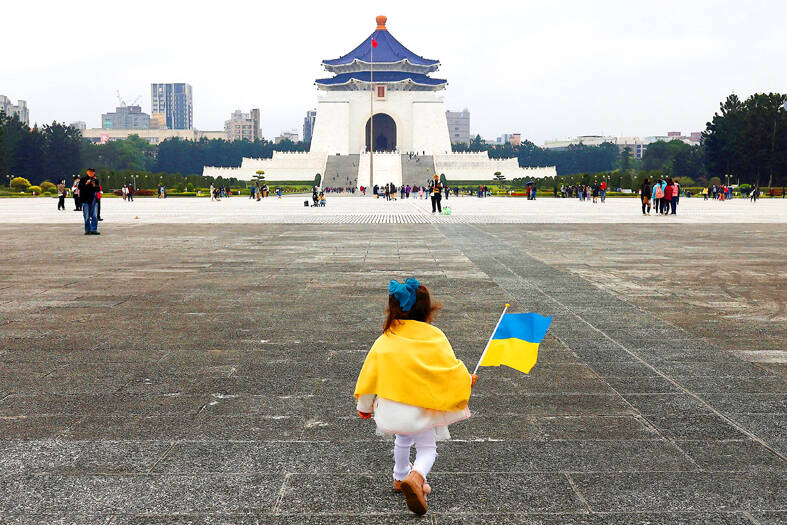The Ministry of Economic Affairs yesterday said that it has expanded a list of sanctioned goods for Russia and its ally Belarus in response to Russia’s invasion of Ukraine to prevent Taiwanese high-tech goods from being used for military purposes.
Taiwan has condemned Russia’s invasion and has already joined a Western-led sanctions effort, although it is largely symbolic as there is only minimal direct trade between the nation and Russia.
Announcing its latest round of sanctions, the ministry said the move was made “to fulfill international cooperation and prevent the export of our high-tech goods for military purposes.”

Photo: Ann Wang, Reuters
The list includes equipment for making semiconductors, as well as certain chemicals and medicines, adding to previous announcements which already targeted the chip industry.
The new sanctions are consistent with those already announced by the EU, the US and other nations, the ministry said in a statement.
The EU, the US and others have collected weapon debris from Ukrainian battlefields and come up with a “common high priority list” of electronic and mechanical parts and equipment that are widely used in commercial applications and can be used to make weapons, it said.
Export license applications would “in principle” not be approved, the ministry said.
Ukraine’s plight has won broad public sympathy in Taiwan due to what many people view as the parallels between what it happening in the European nation and what could happen if China ever uses force to bring the nation it claims as its own territory under Chinese control.

Vincent Wei led fellow Singaporean farmers around an empty Malaysian plot, laying out plans for a greenhouse and rows of leafy vegetables. What he pitched was not just space for crops, but a lifeline for growers struggling to make ends meet in a city-state with high prices and little vacant land. The future agriculture hub is part of a joint special economic zone launched last year by the two neighbors, expected to cost US$123 million and produce 10,000 tonnes of fresh produce annually. It is attracting Singaporean farmers with promises of cheaper land, labor and energy just over the border.

US actor Matthew McConaughey has filed recordings of his image and voice with US patent authorities to protect them from unauthorized usage by artificial intelligence (AI) platforms, a representative said earlier this week. Several video clips and audio recordings were registered by the commercial arm of the Just Keep Livin’ Foundation, a non-profit created by the Oscar-winning actor and his wife, Camila, according to the US Patent and Trademark Office database. Many artists are increasingly concerned about the uncontrolled use of their image via generative AI since the rollout of ChatGPT and other AI-powered tools. Several US states have adopted

A proposed billionaires’ tax in California has ignited a political uproar in Silicon Valley, with tech titans threatening to leave the state while California Governor Gavin Newsom of the Democratic Party maneuvers to defeat a levy that he fears would lead to an exodus of wealth. A technology mecca, California has more billionaires than any other US state — a few hundred, by some estimates. About half its personal income tax revenue, a financial backbone in the nearly US$350 billion budget, comes from the top 1 percent of earners. A large healthcare union is attempting to place a proposal before

KEEPING UP: The acquisition of a cleanroom in Taiwan would enable Micron to increase production in a market where demand continues to outpace supply, a Micron official said Micron Technology Inc has signed a letter of intent to buy a fabrication site in Taiwan from Powerchip Semiconductor Manufacturing Corp (力積電) for US$1.8 billion to expand its production of memory chips. Micron would take control of the P5 site in Miaoli County’s Tongluo Township (銅鑼) and plans to ramp up DRAM production in phases after the transaction closes in the second quarter, the company said in a statement on Saturday. The acquisition includes an existing 12 inch fab cleanroom of 27,871m2 and would further position Micron to address growing global demand for memory solutions, the company said. Micron expects the transaction to